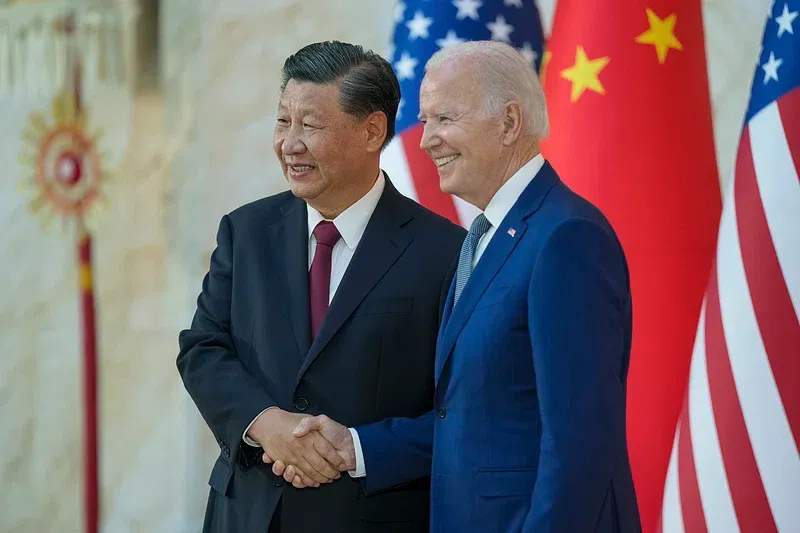Biden Signs Executive Order Restricting U.S. Investments in Key Chinese Tech

The Lede: On Wednesday, President Biden signed an executive order that curbs the flow of U.S. investment into a range of Chinese firms that the administration attributes to national security risks in the ongoing technological competition with Beijing.
What We Know:
- The executive order focuses on restricting investments in three categories of Chinese companies: quantum computing, artificial intelligence, and advanced semiconductors. The White House also declared a national emergency to deal with the threat of advancement by ‘countries of concern,’ citing China, in sensitive technologies that can be used to strengthen and develop military and weaponry as well as intelligence and surveillance capabilities.
- The range of investments is meant to be narrow and disruptions to ordinary capital flows are expected to be limited as the rules will likely not target holdings in publicly traded Chinese companies and other passive types of investment. U.S. venture capitalists and other ‘direct’ investors will be required to notify the Treasury Department of prospective investment into restricted categories.
- The initial implementation of the order will begin next year and will involve an outbound investment review mechanism that will be created after a planned period of consultation in which domestic stakeholders and allied countries will contribute input to refine and clarify the rules. The Treasury Department is expected to start a rule-making process soon in order to better define the scope of restrictions.
The Background: This move follows a series of restrictions imposed by the U.S. on sensitive technology products, most notably chips and related manufacturing items, as well as inquiries from Congress toward companies that have to operations in China. Curbs to investment flows from the U.S. to China have been expected in recent months. Biden administration officials including Commerce Secretary Gina Raimondo and Treasury Secretary Janet Yellen have said that rules should keep the scope of the new investment restrictions as narrow as possible in order to limit negative impacts on the bilateral relationship. Data from the risk consultancy Rhodium Group on U.S. venture capital in China shows investment at a 10-year low last year at $1.3 billion, which is down from the peak of $14.4 billion in 2018.
Likely Outcomes:
- Washington is signaling contradictory messages to Beijing. On one hand, the increase in visits and meetings between the two countries shows that there is an effort to increase dialogue and communication on the diplomatic end of the bilateral relationship. On the other hand, the U.S. continues to push policies that aim to blunt China’s technological advancement, economic power, and military ambitions. Washington wants to have it both ways, but may not be able to walk the tightrope between simultaneously conciliatory and aggressive policies toward Beijing. Other countries aligned with the U.S. in regard to China also seek to strike this difficult balance as the ‘de-risking’ trend takes shape.
- China has likely anticipated all manner of policies from the U.S. and will try to adjust its own interests accordingly. This means shifting global ties and supply chains as well as bolstering domestic industries in light of the U.S. and the West’s pressure. It remains to be seen whether China has enough existing knowledge and technology to meet its needs in the industries that will be affected. The U.S. must also consider the possibility that China may achieve its technological development objectives despite the measures aimed at slowing them down.
Quotables:
“The U.S. habitually politicizes technology and trade issues and uses them as a tool and weapon in the name of national security. We will closely follow the developments and firmly safeguard our rights and interests.” – Liu Pengyu, spokesperson for the Chinese Embassy in Washington D.C.
“The administration scaling back — at a time where aggressive action is needed more than ever — continues the trend of appeasing industry at the cost of national security. We need to stop the flow of American dollars and know-how supporting the [Chinese Communist Party’s] military and surveillance technology rather than solely pursuing half measures that are taking too long to develop and go into effect.” – Michael McCaul, Republican Representative from Texas and chairman of the House Foreign Affairs Committee
“While Western funds may be disappointed about lost opportunities in advanced technology investments in China, there’s so much domestic money chasing these deals China will not be hurt. At the end of the day, China needs technology, not venture capital money.” – Andrew Collier, managing director of Orient Capital Research
“There’s a mountain of evidence that China works through joint ventures to access technology and expertise — not just the hard technology, but the soft skills needed. China has its own cash. One thing the U.S. uniquely offers is expertise from Silicon Valley and Wall Street.” – Liza Tobin, economic expert at the Special Competitive Studies Project
Good Reads:
Biden order proposes new restrictions on China tech investment (Washington Post)
Biden administration restricts American investments in high-tech sectors in China (ABC News)
Biden plans new restrictions on US investments in China, declares ‘emergency’ on sensitive tech (SCMP)
